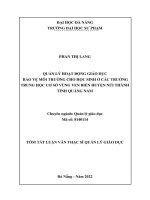TỪ VỰNG TOEIC unit 6
Bạn đang xem bản rút gọn của tài liệu. Xem và tải ngay bản đầy đủ của tài liệu tại đây (272.06 KB, 60 trang )
Unit 6
EQU QUIS PLE/PLEN METR/METER AUD SON ERR CED Words from
Mythology and History
Quiz 6-1 Quiz 6-2 Quiz 6-3 Quiz 6-4 Quiz 6-5 Review Quizzes 6
EQU comes from the Latin word aequus, meaning “equal.” To equalize
means to make things equal. Things that are equivalent have the same value,
use, or meaning. All three sides of an equilateral triangle are of the same
length. And an equation (for instance, 21 + 47 = 68) is a statement that two
mathematical expressions are equal.
equable
(1) Tending to remain calm. (2) Free from harsh
changes or extreme variation.
• Her friends thought it odd that such an equable woman had married a man
so moody and unpredictable.
Equable usually describes either climate or personality. The word seems to
be used less today than in decades past, maybe because the personality type is
less admired than it used to be. A steady, calm, equable personality may not
produce much excitement but usually makes for a good worker and a good
parent, and maybe even a longer life. In the words of the poet Robert Service:
“Avoid extremes: be moderate / In saving and in spending. / An equable and
easy gait / Will win an easy ending.”
adequacy
Being equal to some need or requirement.
• Environmentalists doubt the adequacy of these regulations to protect the
wilderness areas.
When we question the adequacy of health-care coverage, or parking facilities,
or school funding, we're asking if they are equal to our need. The adjective
adequate means “enough” or “acceptable”—though in sentences like “His
performance was adequate,” it really means “no better than acceptable.”
equilibrium
(1) A state in which opposing forces are
balanced so that one is not stronger or greater than the other. (2) A state of
emotional balance or calmness.
• The news had come as a shock, and it took him several minutes to recover
his equilibrium.
Equilibrium contains a root from the Latin libra, meaning “weight” or
“balance.” As a constellation, zodiac symbol, and astrological sign, Libra is
usually pictured as a set of balance scales, often held by the blindfolded
goddess of justice, which symbolizes fairness, equality, and justice.
Equilibrium has special meanings in biology, chemistry, physics, and
economics, but in all of them it refers to the balance of competing influences.
equinox
A day when day and night are the same length.
• She and her friends got together for an equinox party twice a year to
celebrate the arrival of the fall and the spring.
If you know that nox means “night” in Latin, it's not hard to remember the
meaning of equinox. There are two equinoxes in the year: the spring equinox,
around March 21, and the fall equinox, around September 23. The equinoxes
are contrasted with the solstices, when the sun is farthest north and south of
the equator. The summer solstice occurs around June 22 (the longest day of
the year), the winter solstice around December 22 (the shortest day).
QUIS is derived from the Latin verb meaning “to seek or obtain.” The roots
quer, quir, and ques are derived from the same Latin verb and give us words
such as inquiry and question.
inquisition
harsh or severe.
A questioning or examining that is often
• The President's first choice for the job turned him down, fearing the Senate
hearings would turn into an inquisition into her past.
While an inquiry can be almost any search for truth, the related word
inquisition suggests a long, thorough investigation that involves extensive
and harsh questioning. Though the two words originally had about the same
meaning, today inquisition tends to remind us of the Spanish Inquisition, an
ongoing trial conducted by church-appointed inquisitors that began in the
Middle Ages and sought out nonbelievers, Jews, and Muslims, thousands of
whom were sentenced to torture and to burning at the stake.
perquisite
(1) A privilege or profit that is provided in
addition to one's base salary. (2) Something claimed as an exclusive
possession or right.
• A new car, a big house, and yearly trips to Europe were among the
perquisites that made the presidency of Wyndam College such an attractive
position.
Though the Latin source of perquisite originally meant “something insistently
asked for,” the “ask” meaning has mostly vanished from the English word. A
perquisite, often called simply a perk, is instead something of value that the
holder of a particular job or position is entitled to, usually without even
asking. The President of the United States, for instance, enjoys as perquisites
the use of Camp David and Air Force One. Perhaps because perquisites are
usually available to only a small number of people, the word sometimes
refers to non-job-related privileges that are claimed as exclusive rights.
acquisitive
Eager to acquire; greedy.
• With each year the couple became more madly acquisitive, buying jewelry,
a huge yacht, and two country estates.
Unlike most tribal peoples and the populations of some older countries, we
Americans live in an acquisitive society, a society devoted to getting and
spending. And America often makes successfully acquisitive people into
heroes; even Ebenezer Scrooge, that model of miserly greed and
acquisitiveness, was once defended by a White House chief of staff. An
acquisitive nation may seek to acquire other territories by force. But mental
acquisition of specialized knowledge or skills—or new vocabulary!—doesn't
deprive others of the same information.
requisition
made with proper authority.
A demand or request (such as for supplies)
• The teachers had grown impatient with having to submit a requisition for
even routine classroom supplies.
Requisition was originally a noun but is now probably more common as a
verb. So we either can speak of sending our office's purchasing department a
requisition for computers, or of requisitioning more computers from the
department. The word has an official sound to it. However, one of
Hollywood's bittersweet love stories begins when Omar Sharif, playing a
World War II freedom fighter, says to Ingrid Bergman, who is the owner of a
stately old yellow Rolls Royce, “I've come to requisition your car.”
Quiz 6-1
A. Indicate whether the following pairs of terms have the same or
different meanings:
1. equilibrium / weight
same ___ / different ___
2. inquisition /curiosity
same ___ / different ___
3. equable / steady
same ___ / different ___
4. perquisite / salary
same ___ / different ___
5. equinox /May Day
same ___ / different ___
6. acquisitive / greedy
same ___ / different ___
7. requisition / requirement
same ___ / different ___
8. adequacy / surplus
same ___ / different ___
Answers
B. Fill in each blank with the correct letter:
a. equinox
b. requisition
c. equilibrium
d. perquisite
e. adequacy
f. acquisitive
g. equable
h. inquisition
1. They're a quiet, pleasant couple, with very ___ temperaments.
2. You couldn't even get a pencil unless you filled out a ___.
3. In a healthy economy, supply and demand are in a state of approximate
___.
4. Daylight saving time begins in March, shortly before the ___ and the
arrival of spring.
5. There was more than enough water, but he worried about the ___ of their
food supplies.
6. The whole family was ___ by nature, and there were bitter legal battles
over the will.
7. His status as newcomer did carry the special ___ of being able to ask a lot
of questions.
8. Louisa feared an ___ into her background and previous involvements.
Answers
PLE/PLEN comes from a Latin word meaning “to fill.” It can be seen in the
words plenty, meaning basically “filled,” and complete, meaning “thoroughly
filled.”
plenary
(1) Including all who have a right to attend. (2)
Complete in all ways.
• For the convention's plenary session, five thousand members gathered to
hear a star speaker.
Plenary often shows up in writing referring to the “plenary power” held by a
government, and is particularly used for powers mentioned in a constitution.
For example, under the U.S. Constitution, the Congress has plenary power to
wage war, which means that no one else—not the courts, not the states, not
the president—has any power whatsoever to second-guess Congress about
warmaking. But in recent years, that hasn't stopped some presidents from
starting conflicts that looked a lot like wars to most people. At a conference,
the plenary sessions (unlike the various smaller “presentations,”
“workshops,” “forums,” and “seminars” that otherwise fill the day) try to
bring everyone together in the same room.
complement
(1) Something that fills up or makes perfect;
the amount needed to make something complete. (2) A counterpart.
• On the committee, the two young people provided an energetic complement
to the older members.
A complement fills out or balances something. We think of salt as the
complement of pepper (maybe mostly because of their colors), and the right
necktie is a perfect complement to a good suit. Complement can also mean
“the full quantity, number, or amount”; thus, a ship's complement of officers
and crew is the whole force necessary for full operation. Complement is
actually most common as a verb; we may say, for example, that a bright blue
scarf complements a cream-colored outfit beautifully. Don't confuse
complement with compliment, which means an expression of respect or
affection.
deplete
To reduce in amount by using up.
• Years of farming on the same small plot of land had left the soil depleted of
minerals.
The de- prefix often means “do the opposite of,” so deplete means the
opposite of “fill.” Thus, for example, a kitchen's food supplies can be rapidly
depleted by hungry teenagers. But deplete often suggests something more
serious. Desertions can deplete an army; layoffs can deplete an office staff;
and too much time in bed can rapidly deplete your muscular strength.
replete
Fully or abundantly filled or supplied.
• The professor's autobiography was replete with scandalous anecdotes about
campus life in the 1950s.
Replete implies that something is filled almost to capacity. Autumn
landscapes in New England are replete with colorful foliage. Supermarket
tabloids are always replete with details of stars' lives, whether real or
imaginary. And a professor may complain that most of the papers she
received were replete with errors in grammar and punctuation.
METR/METER comes to us from Greek by way of Latin; in both languages
it refers to “measure.” A thermometer measures heat; a perimeter is the
measure around something; and things that are isometric are equal in
measure.
metric
(1) Relating to or based on the metric system. (2) Relating
to or arranged in meter.
• Americans have resisted using the metric system for years, but are now
slowly getting accustomed to a few of the metric units.
The metric system was invented in France in the years following the French
Revolution, and a version of it is now used in most of the world to measure
distance, weight, and volume. Basic metric units include the kilogram (the
basic unit of weight), the liter (the basic unit of volume), and of course the
meter (the basic unit of length—see below). Metric—or more often metrical
—can also refer to the basic underlying rhythm of songs and poetry. So while
the scientists' measurements are usually metric, the poets' are usually
metrical.
meter
(1) The basic metric unit of length, equal to about 39.37
inches. (2) A systematic rhythm in poetry or music.
• The basic meter of the piece was 3/4, but its rhythms were so complicated
that the 3/4 was sometimes hard to hear.
Meter is a metric measurement slightly longer than a yard; thus, a 100-meter
dash might take you a second longer than a 100-yard dash. But the word has
a different sense in music, where people aren't separated by whether they use
the metric system. For a musician, the meter is the regular background
rhythm, expressed by the “time signature” written at the beginning of a piece
or section: 2/2, 2/4, 3/8, 4/4, 6/8, etc. Within a meter, you can create rhythms
that range from the simple to the complex. So, for example, “America the
Beautiful” is in 4/4 meter (or “4/4 time”), but so are most of the rhythmically
complex songs written by Paul Simon, Burt Bacharach, or Stevie Wonder. In
ordinary conversation, though, most people use “rhythm” to include meter
and everything that's built on top of it. In poetry, meter has much the same
meaning; however, poetic meters aren't named with numbers but instead with
traditional Greek and Latin terms such as iambic and dactylic.
odometer
An instrument used to measure distance traveled.
• Jennifer watched the odometer to see how far she would have to drive to her
new job.
Odometer includes the root from the Greek word hodos, meaning “road” or
“trip.” An odometer shares space on your dashboard with a speedometer, a
tachometer, and maybe a “tripmeter.” The odometer is what crooked car
salesmen tamper with when they want to reduce the mileage a car registers as
having traveled. One of life's little pleasures is watching the odometer as all
the numbers change at the same time.
tachometer
A device used to measure speed of rotation.
• Even though one purpose of a tachometer is to help drivers keep their
engine speeds down, some of us occasionally try to see how high we can
make the needle go.
A tachometer is literally a “speed-measurer,” since the Greek root tachmeans “speed.” This is clear in the names of the tachyon, a particle of matter
that travels faster than the speed of light (if it actually exists, it's so fast that
it's impossible to see with any instrument), and tachycardia, a medical
condition in which the heart races uncontrollably. Since the speed that an
auto tachometer measures is speed of rotation of the crankshaft, the numbers
it reports are revolutions per minute, or rpm's.
Quiz 6-2
A. Match the word on the left to the correct definition on the right:
1. meter
a. drain
2. tachometer b. brimming
3. metric
c. counterpart
4. replete
d. beat pattern
5. odometer e. distance measurer
6. deplete
f. rotation meter
7. plenary
g. general
8. complement h. relating to a measuring system
Answers
B. Choose the closest definition:
1. deplete
a. straighten out b. draw down c. fold d. abandon
2. replete
a. refold b. repeat c. abundantly provided d. fully clothed
3. odometer
a. intelligence measurer b. heart-rate measurer c. height measurer d.
mile measurer
4. tachometer
a. rpm measurer b. sharpness measurer c. fatigue measurer d. size
measurer
5. complement
a. praise b. number required c. abundance d. usual dress
6. metric
a. relating to poetic rhythm b. relating to ocean depth c. relating to
books d. relating to particles of matter
7. plenary
a. for hours b. for life c. for officials d. for everyone
8. meter
a. weight b. rhythm c. speed d. force
Answers
AUD, from the Latin verb audire, is the root that has to do with hearing.
What is audible can be heard. An audience is a group of listeners, sometimes
seated in an auditorium. And audio today can mean almost anything that has
to do with sound.


